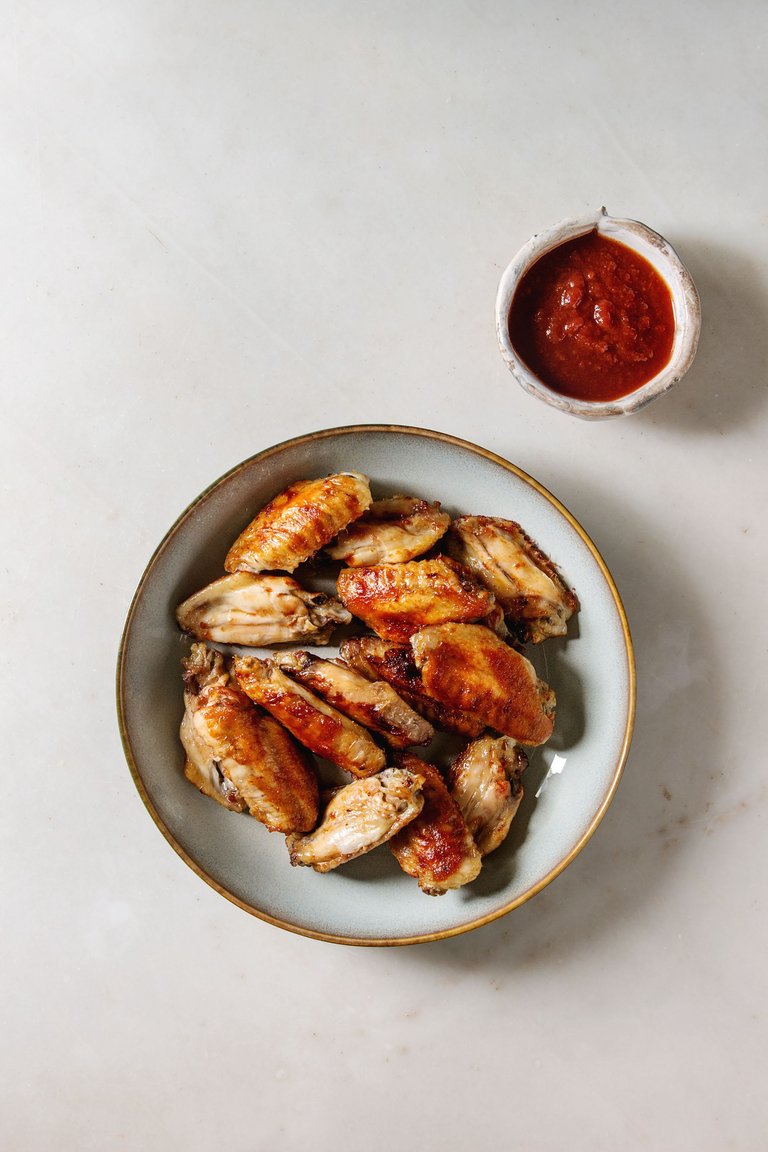
I was walking home from the hardware store when a very familiar and pleasant smell caught my attention. The source wasn’t obvious, but the sensations were unmistakable. It only took a few more steps to see what had lassoed me. There was a takeout chicken wing business a block away, and upwind. I had chicken in my nose.
My eyes scanned the distance between myself and the food place, noting all the other businesses. Cafe, grocer, auto repair shop and cleaners. All had smells associated with them, so why did chicken wings win out?
The answer is cooking oil. Atomized, seasoned oil droplets were drifting in the air and under the noses of potential victims. I didn’t have “Chicken Wing Lover” tattooed on my forehead. Didn’t have it in my social media profile. But these micro-flavor bombs still found me, infused me, and brought on pleasant memories of gatherings where sharing these delights supplemented good times.
Several fond memories go back to smells and tastes that we grew up around, or learned to love, and fats or oils play a large part of that. Grandma’s old recipes just don’t taste the same without heritage cooking ingredients.
I have a favorite cookbook that contains old recipes from about thirty cultures around the world. The preface acknowledges the ingredients are not always the healthiest, but that the foods won’t taste the same without them. Preparing these recipes for friends from other places often steers conversation towards culture and family, spoken of with endearing smiles.
That alone may be worth the undesirable attributes we’ve learned about regarding some cooking fats and oils. Sometimes we tolerate substitutions for health reasons. Some people will claim to add exercise routines to counterbalance ill effects. I’ve been around more than one person who, somewhat jokingly, said they’d run an extra mile or squeeze in more lunges and sit-ups to work off too many treats. For me, I will do whatever it takes to avoid pastries that are not prepared with silky, sumptuous butter. I may only get a nip or a smell, but that’s all it will take to satisfy me.
Every country in the world uses some form of oil or fat to cook with. North America and Europe favor dairy butter, while India filters it for ghee. Rendered poultry fat, or schmaltz, gets used in Eastern Europe and French cuisines. Pork fat, or lard, is the most global of animal fats in use, given the animal size and ease of raising and care.
And then there are oils. Olive is predominant around the Mediterranean. Chinese cuisine favors sesame or peanut oil, while Japan leans towards rice oil. Coconut oil is prevalent across southern Asia. Dendê and other palm kernel oils are essential in western Africa and Brazil, while peanut oil is prevalent in other parts of Africa. Vegetable oils derived from seeds and nuts are inexpensive and have a good shelf life. In particular, canola and soy have a neutral taste and are healthier.
I looked at my watch. The shop wasn’t open yet. They were merely getting ready for the throngs of customers that, like me, enjoyed nibbling on these bite-sized protein nubs, then licking the remnants off our fingers. The closure helped me to ward off temptation and get on with my day. I did, however, take chicken wings out of the freezer when I got home to barbecue with a light marinade.
It wasn’t the same as deep-fried, of course, but those earlier smells still lingered. Combining the healthier preparation with my memories made it a win-win. I’d had my cake and eaten it too.
(Image is free from DepositPhotos)
After my disappointment that I would not see chicken actually in your nose I really enjoyed this. It's so true.....now I"m craving Mary Brown's.....
Hehe, I was actually curious about the chicken in your nose
Those that includes the Sweet Nigerian Jollof Rice, Eguai soup, Amala and ewedu?😁
Popped in from Dreemport, always an awesome #dreemerforlife
It does not. The 1990 book is The Frugal Gourmet On Our Immigrant Ancestors. Thirty-five countries are represented. The African cultures are Ethiopia (Injera Bread, Berbere Sauce, Spiced Butter, Lamb & Cardamom, Lentils, Kifto Raw Beef, Doro Wat Chicken, Collard Greens and Spiced Cheese) and Morocco (Harissa, Kefta Tagine, Chicken Tagine, Roasted Lamb, Lamb Tagine, Chicken & Olives, Lamb Brewats, Bastilla, Preserved Lemons, Burek).
Oh no, I wish it was though.
When you wrote about oils, I rushed to check for West Africa and I smiled because we are live and breath in palm produce...
Although, the Northern part of Nigeria makes use of locally produced peanut oil which is quite expensive and quite rare to get the pure ones as what we see in the market most times are adulterated. In the end we just stick to imported vegetable oils.
The chicken looks really nice, which I could taste some 😍.
I did actually thought you bought the chicken in your nose to satisfy your cravings.
Came in from #dreemport #dreemerforlife
It’s actually sad that we’re known for peanut oil yet it’s so expensive here. I don’t think we’ve ever used peanut oil for food before or maybe I just can’t even remember.
But I rushed looking for any visual representation of that chicken in your nose to meet great disappointment.nice